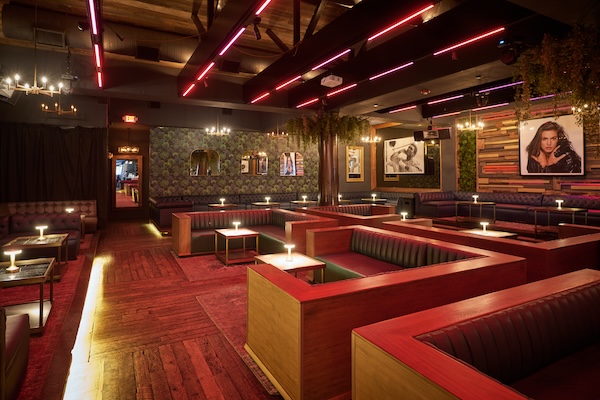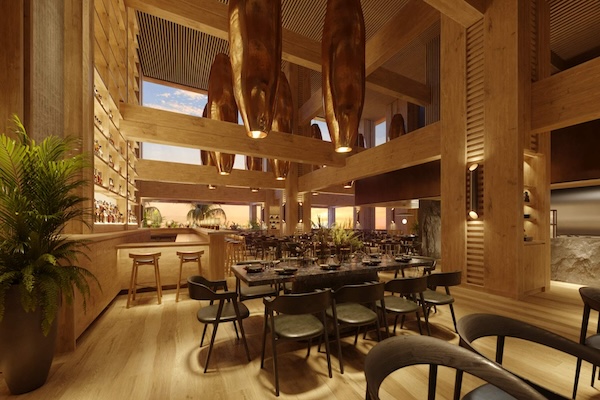In 2020, Sam Nazarian, the CEO of sbe, checked out of hotels, selling the remaining 50% of sbe’s hotel business, which included such brands as SLS, Delano and Mondrian, to Accor. The epilogue was a focus on a food, beverage and nightlife empire, under his Disruptive Restaurant Group, including such sexy hotspots as Katsuya, HYDE Lounge and Skybar.
Four years later, Nazarian got the urge to jump back into the hotel space and he’s doing it this time with a somewhat unlikely partner, Wyndham Hotels & Resorts, a hotel company with a reputation that is high on value, lower on sensuality. But a genuine friendship between Nazarian and Wyndham Hotels & Resorts President and CEO Geoff Ballotti makes the union a perfect match.
In what is being billed as “smart lifestyle,” sbe and Wyndham will embark on a brand with a working name of Project HQ Hotels & Residences (the HQ a nod to headquarters and being at the locus of communities), a concept with a focus on millennial and Gen-Z cohorts that promises to be “approachable,” and for those consumers that oftentimes find themselves priced out of the somewhat nebulous lifestyle hotel market space.
The announcement—contemporaneous with the much publicized hostile bid by Choice Hotels International for Wyndham’s hotel business—comes on the heels of sbe’s new equity partnership with singer and entrepreneur Marc Anthony and his company Magnus. The expectation is to open 50 hotels by 2030. The brand will fall under Wyndham’s Registry Collection Hotels, able to tap into the scale of Wyndham Rewards, Wyndham’s loyalty program, which has some 105 million enrolled members.
Game Recognizes Game
Nazarian, by his own admission, was itching to get back into the hotel space. “I’ve been out of the game for a few years,” he said. But in that time, sbe was incubating ideas and seeking to identify what type of product could make for the biggest disruption. Knowing that they wanted to go after what he referred to as the “new consumer,” who has been eschewing traditional hotels for the likes of Airbnb, the idea is to create a quasi-mashup of luxury and lifestyle, a segment that sbe is well versed in, but in a more affordable, approachable way. “We’re looking to go after a demographic that is very difficult to be authentic with,” Nazarian said.
The new smart lifestyle product is meant predominantly as a conversion play of existing commercial real estate, with a focus on food and beverage and wellness components, which would include sbe wellness programming, such as med spa offerings. As an investment, Nazarian, presciently, recognizes that many existing buildings necessitate repurposing in order to adapt and conform to a different type of post-pandemic living and working. “Hotel owners, who have a sensitivity to return on investment, and who are up against contracts that are coming up with legacy hotels, are trying to figure out what to do to build a really unique product that resonates for a consumer that we think has not been targeted correctly,” he said.
sbe teaming up with Wyndham on the new brand is a potential jolt for Wyndham’s expansive loyalty membership, ultimately giving them an attractive option to cash in points for stays. Wyndham’s Ballotti made that clear from the jump. “It’s having aspirational redemption opportunities,” he said, alluding to the thousands that stay at Days Inns and Super 8s throughout the year, perhaps for work reasons, but when it’s time to take a family vacation or to pamper themselves, want options that are in a higher echelon of product. Ballotti also said that Wyndham Rewards has “become younger” in membership, making it vital to fill in gaps where the franchisor is not already represented.
Pricing for the product would be more in the range of $250 to $500 a night, Ballotti said, “which our dual-income guests can increasingly afford.”

Building It Out
The new brand also taps into what is an increasingly “on-trend” development play: conversions, or taking existing stock and repurposing it. It’s especially effective in a period of higher borrowing costs that has increased the cost of capital and made it more difficult to generate robust returns. According to Nazarian, development costs would be a palatable $30,000 to $50,000 per key. The brand is also positioned to be global: Nazarian said they are already touring potential sites in Europe, the U.S. and the Middle East. College campuses are also a target.
“We’ve talked so much about how this conversion market is overheated right now and with the some 17 million rooms around the world—more than 50% of them are unbranded,” Ballotti said. “Developers are looking for something that’s going to put more relevance into the real estate.”
At this, Nazarian turns nostalgic; you get the sense that Nazarian’s hope for his new hotel execution will mirror some of the trailblazing brands of yesteryear—from Starwood’s seminal W to André Balazs’ Standard and Chateau Marmont. “Back in the day, when W first started, the initial idea Barry [Sternlicht] had was taking great buildings and slapping a great brand on them, and bringing in people like Rande Gerber to run the bars—that was disruptive,” he said, similarly invoking Balazs and his buying up “cool buildings in L.A.” and flipping them upside down. “It was a place we all wanted to be—the who’s who of those communities coming there and enjoying it. That’s really what I think is missing today.”
Despite sbe and Wyndham on the surface appearing like strange bedfellows, Nazarian said there really wasn’t another hotel company that he considered, and that speaks to his long friendship with Ballotti, a relationship that stretches back decades to when Ballotti was with the now-defunct Starwood Hotels & Resorts, acquired by Marriott International in 2016, but which one could argue was the first large hotel company to successfully mine the luxury/lifestyle space at scale.
A simple text from Nazarian to Ballotti started what was to become the eventual partnership, which was consummated within weeks. Ballotti acknowledged that Wyndham could never do a brand like this on its own (“it’s not in our DNA”) and that the core focus remained in the economy and midscale segments. He emphasized that Wyndham has also now fully exited from managing hotels to become a pure-play franchisor. In the case of the new brand, sbe would be the manager.

Brand Building
Getting a new brand off the ground takes time, planning and focus. Nazarian admits that his prior brands, like SLS, were created first and the real estate was identified second. By the time SLS had its first location in Beverly Hills, the brand was fully fleshed out, with iconoclasts like Philippe Starck and José Andrés already onboard to deliver design and F&B. Project HQ is a bit different, with locations first being identified as the brand takes shape. One thing is certain, food and beverage and entertainment are at the core of a lifestyle experience and, Nazarian stressed, elemental the new brand.
“I think lifestyle is an overused word today,” Nazarian said. “Everything’s lifestyle, but at its core, the authentic definition of lifestyle is experiences and we have always made it a mission to bring the hotel piece and the food and beverage and entertainment piece all under one common operation.”
More than half of all revenue can often be generated from F&B and entertainment in a lifestyle hotel, Nazarian said. Certainly, sbe has been at the vanguard in delivering those experiences, and its current roster of F&B and entertainment brands will be cornerstones of the new brand.
The overriding message: Never bet against sbe: “No one would have thought that we were going to build a 14,000-square-foot restaurant around Spanish tapas in Beverly Hills,” referring to the Bazaar, at SLS Beverly Hills, which subsequently closed in 2020. “They thought we were nuts, right?” Nazarian said. “But we took a chance.”
Wyndham and sbe hope the odds are in their favor again.
